The Los Angeles Dodgers are one of very few professional sports franchises to carry the distinction of having drawn more than three millions fans (based on ticket sales) every year for the past two decades. In fact, they have done so a total of 30 times since the franchise moved to Los Angeles from Brooklyn in 1958. And while fans from around the world still marvel at the incredible beauty of baseball’s third oldest ballpark midway through its 54th season, many are completely unaware that the construction of Dodger Stadium almost didn’t happen; and even fewer are aware that beloved Hall of Fame broadcaster Vin Scully actually played a key role in it happening at all.
Is this true? Did Vin Scully actually have this kind of juice even back in 1958?
The short answer is yes, but as you might have guessed, there is a lot more to this story.
Although many longtime Brooklyn Dodger fans still blame former Dodgers owner Walter O’Malley for moving their beloved Bums from Brooklyn to Los Angeles in 1958, the truth of the matter is that O’Malley, who was born and raised in Brooklyn, did everything that he possibly could to keep the team in the borough. Unfortunately, New York City Parks Commissioner Robert Moses, who had tremendous power and say regarding land and construction projects in New York City, absolutely refused to allow O’Malley to build a new stadium in Brooklyn to replace the extremely outdated Ebbets Field – this in spite of the fact that O’Malley agreed to finance the new stadium entirely out of his own pocket.
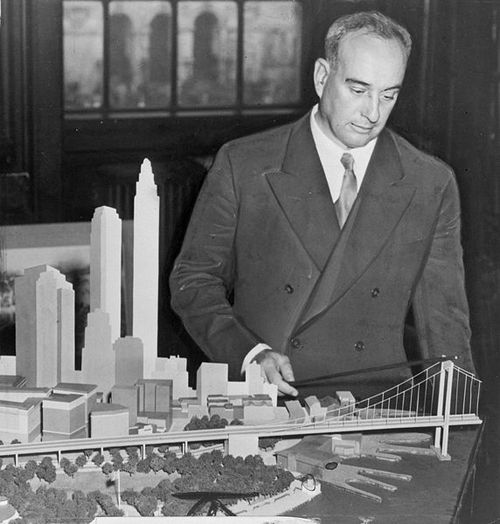
New York City Parks Commissioner Robert Moses did many great things for the City of New York, but he did absolutely nothing to help Walter O’Malley keep the Dodgers in Brooklyn. (AP Photo)
Believing that O’Malley was bluffing about actually moving the Dodgers out of New York, Moses refused to back down and instead offered the Dodgers owner land near Flushing Meadow to build his new stadium – land on which Shea Stadium was eventually build and where Citi Field stands today; land that is in the borough of Queens not Brooklyn. (Somehow the Queens Dodgers or even worse, the Flushing Dodgers, doesn’t have a very good ring to it).
But O’Malley was not bluffing – it was either Brooklyn or move the team to Los Angeles, where city officials had been courting the Dodgers owner since 1956 and were more than willing to work with him on acquiring land for a new stadium. Thus, it was Robert Moses who forced O’Malley’s hand and on September 24, 1957 the Dodgers played their final game at Ebbets Field.
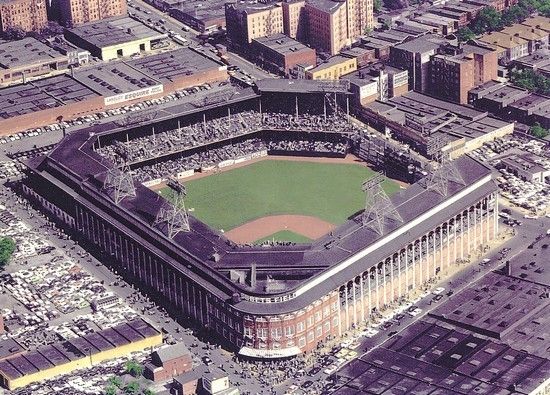
The Brooklyn Dodgers played their final game at Ebbets Field on Tuesday, September 24, 1957 in front of 6,702 fans beating the Pittsburgh Pirates 2-0. (AP photo)
The move to Los Angeles wasn’t without its problems for O’Malley; in fact, there were huge problems. While L.A. City officials welcomed O’Malley and his Dodgers with open arms, many others did not – most notably a man named John Smith who owned the San Diego Padres, a Triple-A team in the Pacific Coast League. It was Smith’s contention that allowing the Dodgers to build their own stadium in Los Angeles would be an economic threat to his minor league franchise – a franchise that would one day itself become a major league expansion team.
To compound matters, resistance to O’Malley’s plan to build a new stadium near downtown Los Angeles was intense because the land on which the city had approved for the proposed construction of Dodger Stadium, Chavez Ravine, was home to hundreds of low-income residents and undocumented workers who would be forced to leave their homes – many of which were without running water or electricity. As a result, opponents of the new stadium forced the matter to be put before L.A. voters in a referendum titled Proposition B.
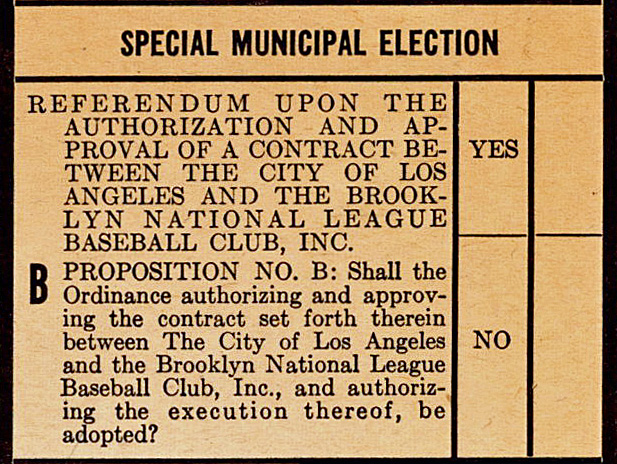
Proposition B as it appeared on the June 3, 1958 ballot.
(Image courtesy of griddle.baseballtoaster.com)
Although it wasn’t discovered until after the election, the driving force lobbying against Proposition B was none other than John Smith.
So how does Vin Scully play into all of this?
This excerpt from Neil J. Sullivan’s outstanding 1989 book The Dodgers Move West pretty much sums it up:
“Perhaps the most formidable asset which Walter O’Malley might have brought to bear in support of Proposition B was the Dodgers’ announcer, Vin Scully. Scully was immediately popular in Los Angeles, and with the team doing so poorly [in 1958] he became the focus for much of the enthusiasm about the team. He was the only member of the Dodgers having a good year. Scully relates that Walter O’Malley never discussed the political contest with him, nor suggested that Scully try to sway voters during his broadcasts. Such an attempt might have been received as a crude measure and triggered a backlash, but the tactic was apparently never even considered. Scully also reports that he personally felt no responsibility for the outcome of the referendum. He maintains he didn’t consider the seriousness of Proposition B until after the election was over. Up to that point, he was as unaware as Walter O’Malley about the exercise in direct democracy, and only later realized how fragile a hold the Dodgers had on Los Angeles. The announcer’s innocence served the Dodgers very well.”
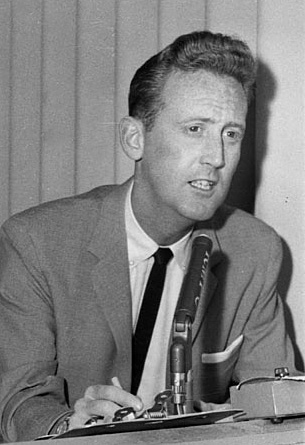
Although no one knew it at the time, Scully’s relationship with L.A. Dodgers fans would have a huge impact on the future of Dodger Stadium. (AP photo)
In the largest turnout for a non-presidential election (62.3%), Los Angeles voters passed Proposition B by the slimmest of margins – 351,683 in favor, 325,898 opposed, a difference of only 25,785 votes – not even the average attendance of a single Dodgers game. Had the ballot measure failed, the Dodgers, in all likelihood, would have moved elsewhere – most likely Minneapolis, which was lobbying hard for an MLB team and eventually landing the Washington Senators and renaming them the Minnesota Twins. (Can you even imagine?).
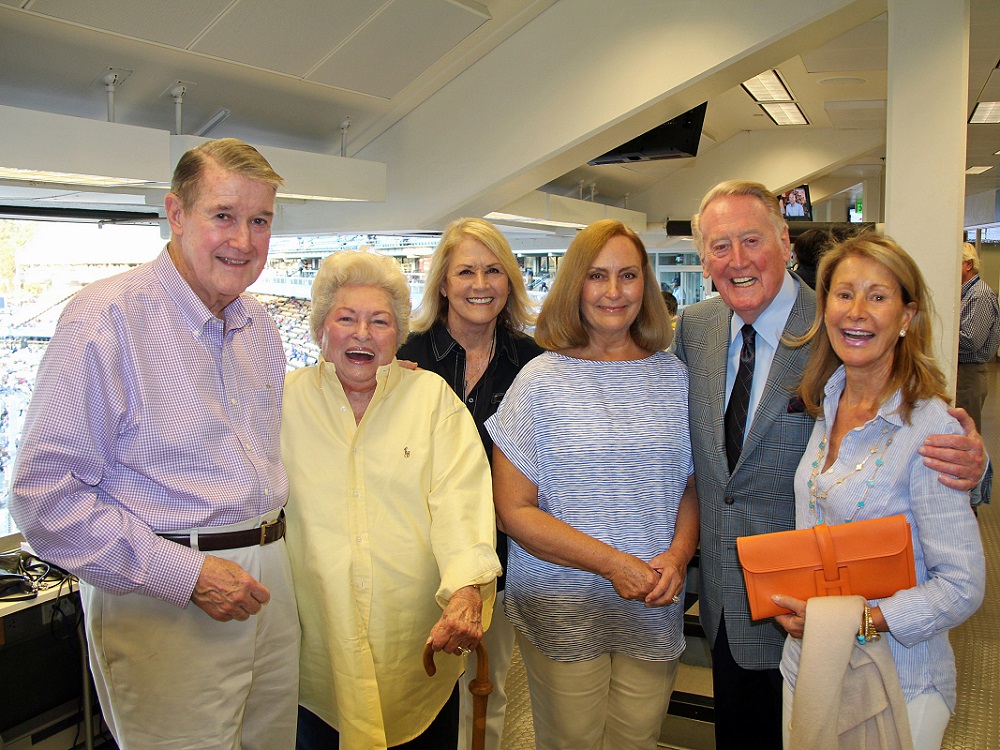
Vin Scully has been very close friends with the O’Malley family for over 67 years.
(L to R: Peter O’Malley, Jo Lasorda (Tommy’s wife), Sharon Hough (Charlie’s wife) Yvonne Stephenson (widow of former Dodger Jerry Stephenson), Vin and Annette O’Malley (Peter’s wife).
(Photo credit – Ron Cervenka)
Did Vin Scully’s love affair with Dodgers fans, even brand new Los Angeles Dodger fans have a direct impact on the final outcome of Proposition B?
I’ll let you be the judge of that.
* * * * * * * *
References:
The Dodgers Move West – Neil J. Sullivan p-145
Walter O’Malley Official Website – June 3, 1958




 June 27th, 2016 at 6:00 am
June 27th, 2016 at 6:00 am  by Ron Cervenka
by Ron Cervenka  Posted in
Posted in 

Very interesting!
The largest turnout for a non-presidential election with less than 700,000 total votes in LA. Incredible, until I remember walking to school through orange, lemon and lime groves in those days. Oranges were good eating, lemons and limes were good for throwing. Anybody remember having lemon fights? Good days!
I wonder how the parents voted.
As it’s well known I remained a Dodger fan after they moved out to Los Angeles, but I think it would’ve been a lot better, for me, if they would’ve moved to Queens.
Can’t only think about yourself. Besides, don’t you remember hearing that famous advice? “Go west young man”.
Certainly would have been better for me too OBF as I could get games at a good hour for me on Atlantic Standard Time. However, the way things played out there was little choice but to move and my heart went west also. It’s over and done and I will always love the Brooklyn Dodger but that does not preclude my continued interest and love for “Dodgers” regardless of their location. If they moved again, I would go with them.
Absolutely love seeing “Dodgers” on the away uniforms even in losing to Pittsburgh.
Sorry guys! I am sure it was painful to see the Dodgers go.
My 21 yr old daughter, who has been going to college close to Chicago the last three years, just came home for the summer yesterday. She has a male friend at college, who a year ago flew to Reno during spring break to ask me if it was OK to date her. They ambushed me! I had planned to double date with her starting around age 30. Anyways he is a keeper, but, he is from Maryland. The daughter announced yesterday, she is probably going to live on the east coast after graduating next year. Says since our family is smaller, it would be easier if we moved back east than his family moving west. So I can relate.
This is a bit hard to believe but my family moved to Edmonton, Alberta in June of 1957. I stayed there until 1962 studying only one time zone away from Los Angeles. Ron Fairly played with the Edmonton entry in the Western Canada League in 1957 so I watched him play as my favorite player never dreaming the Dodgers would sign him in 1958.
So I did go west – young man – but returned to Nova Scotia in 1962.
If Vin had the same effect on LA folks as he did on me he definitely influenced that vote. He may have influenced that 25,000 in favor. If someone asked me the most enjoyment I get out of Dodger baseball it would still be listening to Vin Scully describe the plays, the game, the history, the anecdotes, that voice.
Amen to that!!! There will NEVER be another…at least in my lifetime.
Having been blessed to have come to know Vin personally, I can assure you that his humility would never allow him to take even the slightest amount of credit for the way that the vote turned out; that’s just who he is.
That being said, I received a comment to this article on Twitter this morning from a self-proclaimed author saying that there was no way that Vin didn’t know that he was swaying the vote. Needless to say, I blocked this … person.
In 1957 the total number of MLB teams west of Missouri was 0. Meanwhile New York City had 3. As a 9 year old when I got interested in baseball (1959), living in Los Angeles, I didn’t see any reason for sympathy.
With a more mature outlook now I can understand how they felt. I can’t imagine just thinking, “OK, Dodgers are gone, we still have the Angels.” But still, I think it was a good move for the Dodgers (and Giants). It was also good for MLB, since it started the westward expansion. There are now teams in Colorado, Arizona, Washington, and 5 in California.
Of course, it was good for me too. I don’t live in California anymore, may never visit there again, so their location doesn’t matter to me. Wherever they are, I’m a Dodgers fan.
Good point about expansion and inclusion of millions of fans brought into the MLB fold. No matter which venue they are playing in the stands are still dotted with fans wearing Dodger Blue.
I like to think the Dodgers led the expansion of MLB just as they have led in so many other ways – integration in baseball, international signings from the Asia Pacific Region, development of minor league baseball system, significance of scouting department, community outreach, maintenance of uniform respectability in the silly uniform era, first female head athletic trainer for a major professional team, Dodgers’ Campo Las Palmas Academy in the DR which was the catalyst for today’s Dominican baseball industry, the greatest and most enduring voice in baseball,etc. I’m sure we could add more to that list.It’s early in the morning here so I’m still groggy.
I don’t think any other team in professional sports has given a color the significance that the Dodgers have with “Dodger Blue”.
Very interesting piece, thanks! I still remember the day it was announced that my favorite MLB team was moving to LA (we lived in Torrance). My Mother knew nothing about baseball, but knew that I loved the Dodgers. When I got home from school she was waiting for me on the front porch with the news. I could hardly believe that MY team was coming to LA!